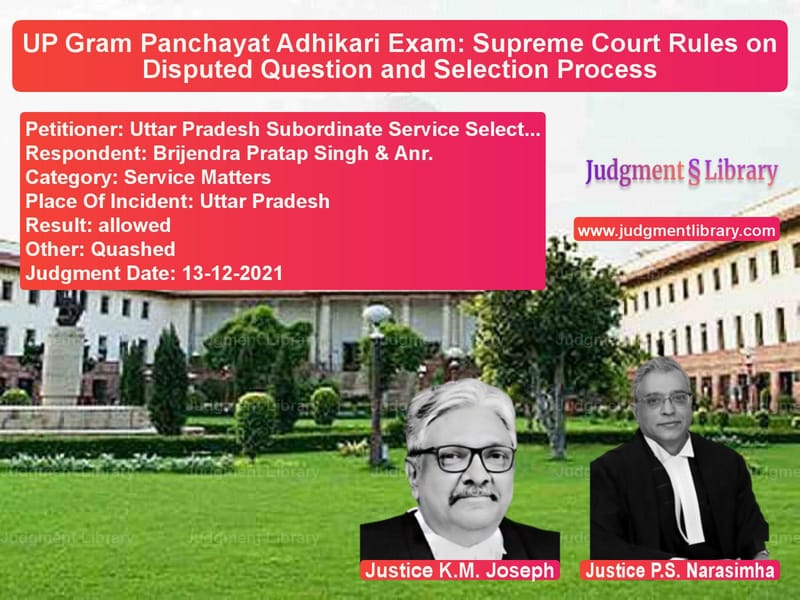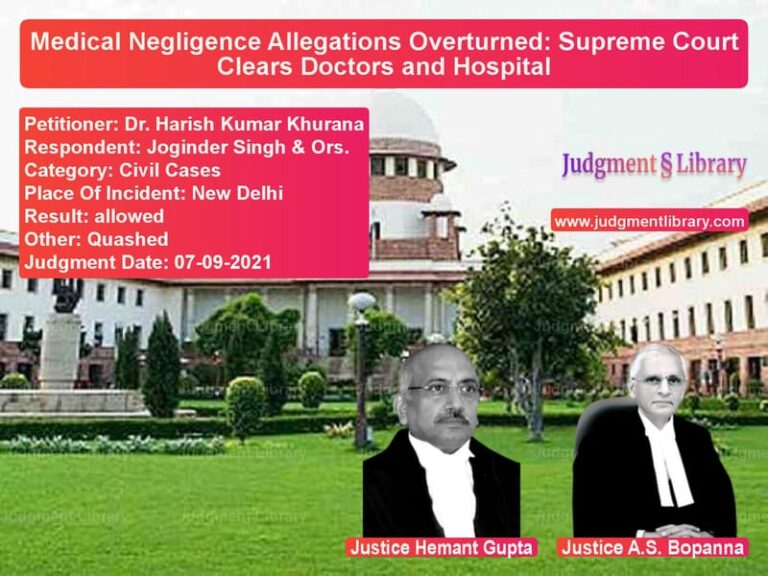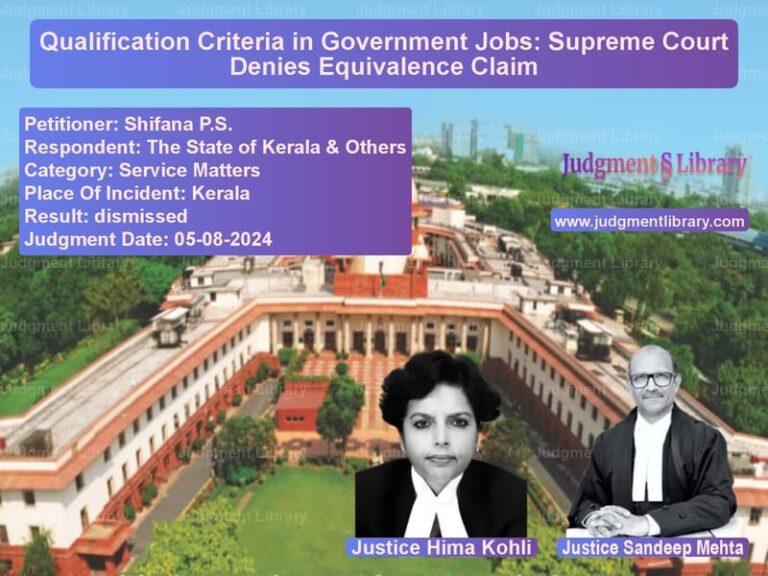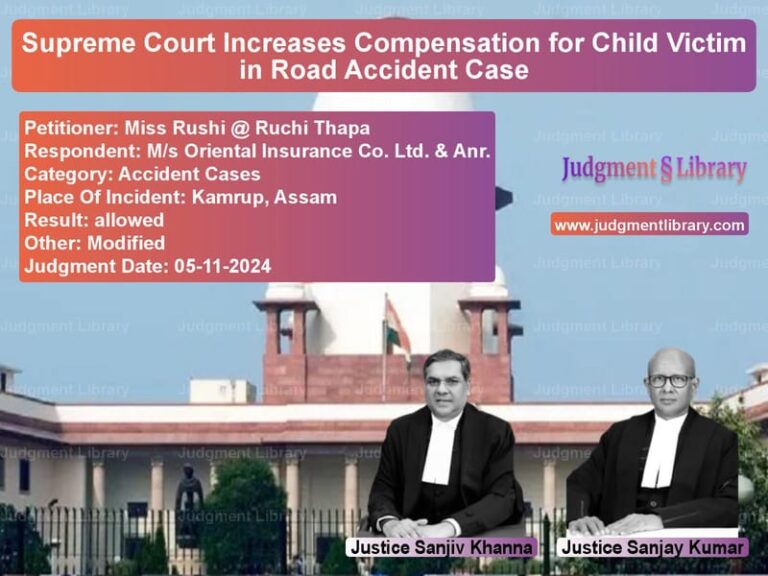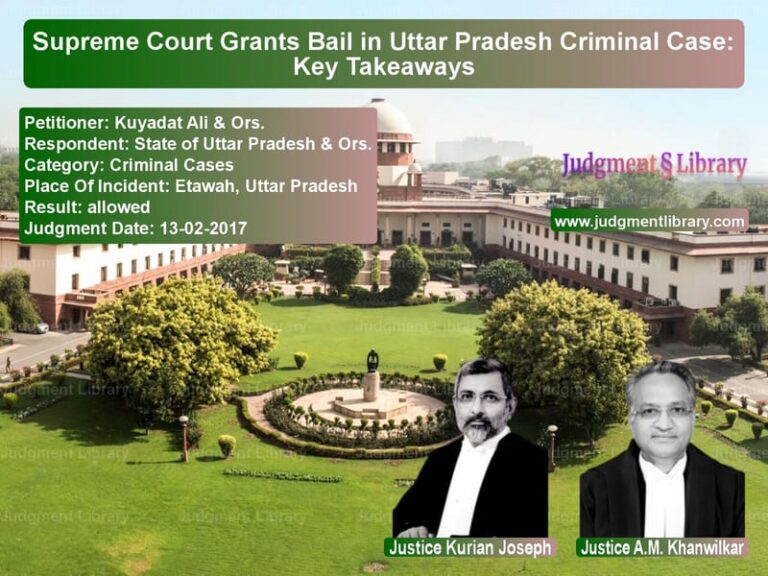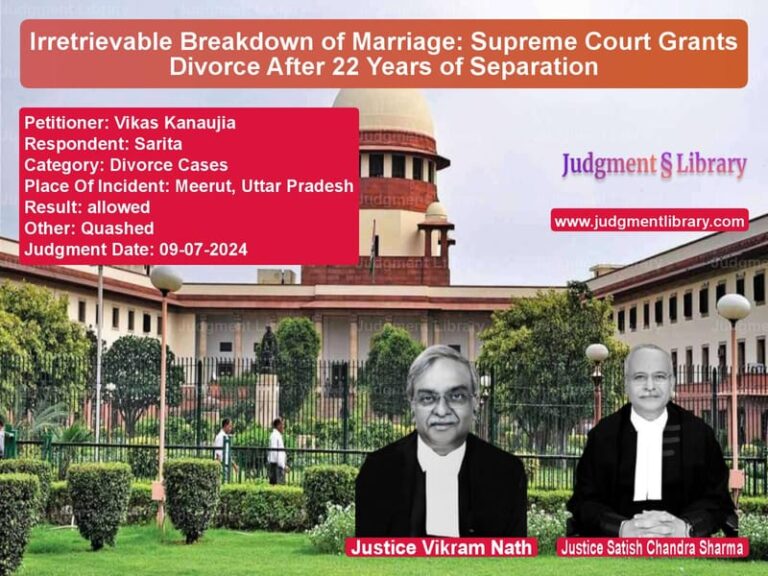UP Gram Panchayat Adhikari Exam: Supreme Court Rules on Disputed Question and Selection Process
The Supreme Court of India recently delivered an important ruling in Uttar Pradesh Subordinate Service Selection Commission & Anr. vs. Brijendra Pratap Singh & Anr., addressing a dispute regarding a wrong answer in the Gram Panchayat Adhikari examination. The case involved whether a question in the recruitment test was incorrect and whether an additional mark should be granted to an affected candidate. The Court upheld the selection commission’s decision and overturned the High Court’s order that had directed a re-evaluation.
Background of the Case
In June 2015, the Uttar Pradesh Subordinate Service Selection Commission (UPSSSC) issued a recruitment advertisement for the post of Gram Panchayat Adhikari. The examination was conducted on February 21, 2016. However, a controversy arose regarding Question No. 46, which asked:
“Presently, who is the Panchayati Raj Minister in Uttar Pradesh?”
The answer options were:
- A. Shivpal Yadav
- B. Kailash Yadav
- C. Balram Yadav
- D. Durga Prasad Yadav
By the time the exam was conducted, Kailash Yadav (Option B) had passed away on February 9, 2016. The answer key, published on February 25, 2016, still listed Option B as correct. The Commission later acknowledged the issue and awarded one mark to candidates who had either chosen Option B or left the question unanswered. However, candidates who selected other options, including the respondent Brijendra Pratap Singh (who chose Option A), did not receive any marks.
Feeling aggrieved, Brijendra Pratap Singh challenged this decision before the High Court.
Legal Issues Raised
- Whether the Commission’s decision to award marks selectively was justified.
- Whether candidates who chose the incorrect answer (Option A) should also be granted one mark.
- Whether the High Court had the authority to direct a re-evaluation or deletion of the question.
Petitioner’s Arguments (UPSSSC)
- The Commission argued that as on the date of framing the question, Kailash Yadav was indeed the Panchayati Raj Minister, and the question was factually correct at the time.
- Since he had passed away before the examination, candidates who had chosen Option B were given the benefit of the doubt.
- Candidates who left the question unanswered were also given marks, as there was no correct option at the time of the test.
- However, candidates who marked incorrect answers (A, C, or D) had no valid claim to additional marks.
- The decision of the Commission was reasonable and aligned with the Kanpur University vs. Samir Gupta (1983) 4 SCC 309 precedent, which states that courts should not interfere in academic matters unless the decision is palpably perverse.
Respondent’s Arguments (Brijendra Pratap Singh)
- The respondent argued that the Commission’s decision was arbitrary and discriminatory.
- Since none of the options were correct at the time of the exam, all candidates should have been awarded one mark, irrespective of their choice.
- He contended that awarding marks to only some candidates was unjustified.
- He relied on Guru Nanak Dev University vs. Saumil Garg (2005) 13 SCC 749, where the Court ruled that candidates should not suffer due to incorrect or vague questions.
High Court’s Verdict
The Division Bench of the Allahabad High Court ruled in favor of the respondent and directed UPSSSC to either:
- Delete Question No. 46 and rework the merit list, or
- Award one mark to the respondent as well.
The Commission challenged this ruling in the Supreme Court.
Supreme Court’s Verdict
The Supreme Court, in a bench comprising Justices K.M. Joseph and P.S. Narasimha, ruled in favor of UPSSSC and set aside the High Court’s order. The Court emphasized the limited scope of judicial review in academic matters and held that the Commission’s decision was reasonable.
The Court observed:
“The decision to award marks to candidates who marked Option B or left the question unanswered was a reasonable classification based on the fact that, at the time of framing the question, Kailash Yadav was the correct answer.”
Key Observations by the Supreme Court
- The Commission acted reasonably in granting marks to candidates who had chosen Option B, as that was correct when the question was framed.
- Those who did not attempt the question should not be penalized because the correct answer had changed due to unforeseen circumstances.
- However, candidates who selected a wrong option (A, C, or D) had no basis for claiming additional marks.
- Re-evaluating the results or deleting the question years after the examination would create unnecessary complications and disrupt the selection process.
- The Court reiterated the principle from Kanpur University vs. Samir Gupta that judicial review should not interfere with the decision of expert bodies unless it is arbitrary or irrational.
The Supreme Court ruled:
“We find no illegality in the decision taken by the Commission. The classification is based on rational criteria, and the High Court’s interference was unwarranted.”
Final Order
- The Supreme Court allowed the appeal and set aside the High Court’s decision.
- It upheld the Commission’s decision to grant marks only to candidates who had chosen Option B or left the question unanswered.
- The respondent’s demand for additional marks was rejected.
Key Takeaways
- Judicial review in academic matters is limited: Courts should not intervene unless there is clear arbitrariness.
- UPSSSC’s decision was reasonable: Awarding marks to some candidates while excluding others was based on rational classification.
- Past judicial precedents upheld: The Court reaffirmed that selection commissions are best placed to decide on examination disputes.
- No retrospective changes: Re-evaluating results years later can create unfairness for selected candidates.
This ruling reinforces the principle that minor discrepancies in exams should not be used to disrupt large-scale recruitment processes.
Petitioner Name: Uttar Pradesh Subordinate Service Selection Commission & Anr..Respondent Name: Brijendra Pratap Singh & Anr..Judgment By: Justice K.M. Joseph, Justice P.S. Narasimha.Place Of Incident: Uttar Pradesh.Judgment Date: 13-12-2021.
Don’t miss out on the full details! Download the complete judgment in PDF format below and gain valuable insights instantly!
Download Judgment: uttar-pradesh-subord-vs-brijendra-pratap-sin-supreme-court-of-india-judgment-dated-13-12-2021.pdf
Directly Download Judgment: Directly download this Judgment
See all petitions in Recruitment Policies
See all petitions in Public Sector Employees
See all petitions in Judgment by K.M. Joseph
See all petitions in Judgment by P.S. Narasimha
See all petitions in allowed
See all petitions in Quashed
See all petitions in supreme court of India judgments December 2021
See all petitions in 2021 judgments
See all posts in Service Matters Category
See all allowed petitions in Service Matters Category
See all Dismissed petitions in Service Matters Category
See all partially allowed petitions in Service Matters Category

